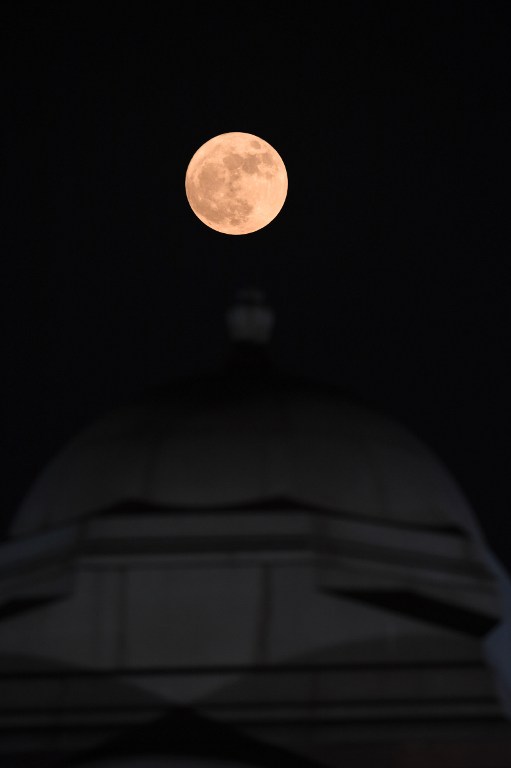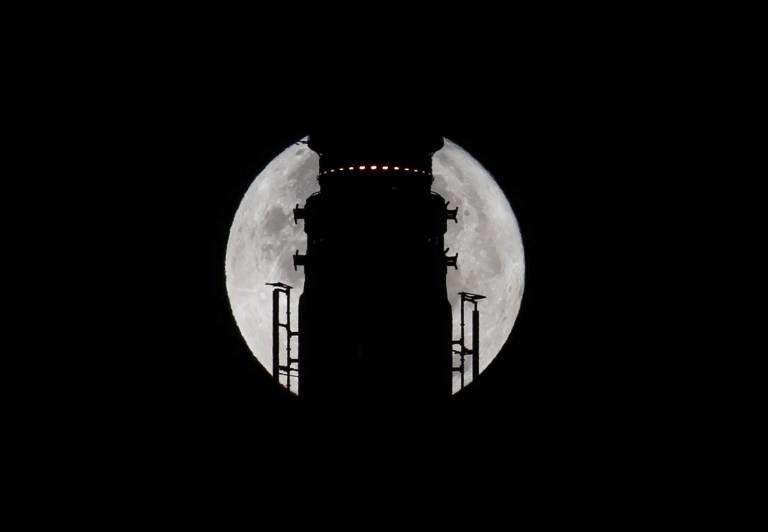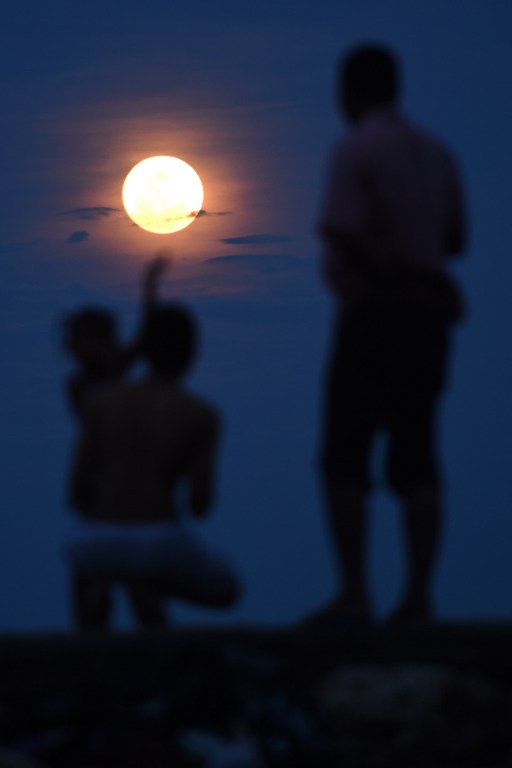
Skygazers headed to high-rise buildings, ancient forts and beaches on November 14 to witness the closest “supermoon” to Earth in almost seven decades, hoping for dramatic photos and spectacular surf. The moon will be the closest to Earth since 1948 at a distance of 356,509 kilometres (221,524 miles), creating what NASA described as “an extra-supermoon”. / AFP PHOTO / Prakash SINGH
by Sam Reeves
Jakarta, Indonesia (AFP) — Skygazers took to high-rise buildings, observatories and beaches Monday to get a glimpse of the closest “supermoon” to Earth in almost seven decades, and snap dramatic pictures.
The unusually big and bright moon appeared at its most impressive just as night fell over Asia, but astronomy enthusiasts will be able to see Earth’s satellite loom large anywhere in the world shortly after sunset, weather permitting.
The phenomenon happens when the moon is full at the same time as, or very near, perigee — its closest point to Earth on an elliptical, monthly orbit.
It was the closest to Earth since 1948 at a distance of 356,509 kilometres (221,524 miles), creating what NASA described as “an extra-supermoon”.

Skygazers took to high-rise buildings, observatories and beaches Monday to get a glimpse of the closest “supermoon” to Earth in almost seven decades, and snap dramatic pictures. The phenomenon happens when the moon is full at the same time as, or very near, perigee — its closest point to Earth on an elliptical, monthly orbit. / AFP PHOTO / DON EMMERT
Skygazers and photographers headed to the best viewing spots in Asia, where the phenomenon was visible first, hoping that cloudy skies and the perennial pollution that blights many of the region’s cities would not spoil the fun.
The eastern Sydney suburb of Bronte became an unexpected viewing spot as thousands of people armed with picnic mats and cameras packed its small beach near Bondi to catch a glimpse of the supermoon after a Facebook invite went viral.
Loud cheers went up among the crowd as the moon made brief appearances between heavy, grey clouds before disappearing.

Skygazers headed to high-rise buildings, ancient forts and beaches on November 14 to witness the closest “supermoon” to Earth in almost seven decades, hoping for dramatic photos and spectacular surf. The moon will be the closest to Earth since 1948 at a distance of 356,509 kilometres (221,524 miles), creating what NASA described as “an extra-supermoon”. / AFP PHOTO / SONNY TUMBELAKA
“It’s really nice,” Aidan Millar-Powell told AFP of the festive, community atmosphere at the beach. “People don’t usually come together like this in Sydney for a natural phenomenon.”
Tourists, office workers and couples crowded the Hong Kong waterfront as the supersized moon rose over the skyscrapers of the financial hub, while further north in the Chinese capital Beijing the moon climbed spectacularly over the city’s skyline.
“I’ve never seen a moon this big,” said Lee Pak-kan, 44, who was watching at the Hong Kong waterfront. “The moon is quite orange too… it’s quite special.”
In the Taiwanese capital Taipei, more than 100 people queued up to get a look at the spectacle through telescopes outside a major public hall, while others flocked to the city’s landmark Taipei 101 skyscraper — one of the world’s tallest buildings — to witness the supermoon.
“It’s quite moving, to see it up close. It’s so big, so round, so bright,” said Julia Lee, who was peering through a telescope outside the hall.
– ‘More super than others’ –
Special viewing events were being organised by astronomy groups, with members of one in Indonesia’s Yogyakarta — the heart of an ancient sultanate — taking to the rooftop of their club headquarters to get a glimpse of the supermoon as it rose over the city’s historic buildings.
Meanwhile, professional astronomers were at the ready at observatories across the region to explain the phenomenon to curious members of the public.
In Thailand, astrologers were variously predicting the supermoon would bring disaster or great fortune.
Soraja Nuan-yoo, renowned for predicting the 2004 tsunami that killed many in Thailand and other countries round the Indian Ocean, warned that when the moon gets close to the Earth, “natural disasters happen”.
The supermoon also means a stronger high tide, something that gets surfers giddy with excitement, not only at the prospect of riding bigger waves, but doing so at night.
Forecasters had predicted higher than usual tides on the popular Indonesia’s Bali, a favourite with surfers.
But the holiday island was overcast and rainy when the moon rose, with surfers deciding not to take to the waters.
Astronomers say it can be hard to notice that the moon appears brighter than usual. Once it is high in the sky, it can be hard to tell it is larger but on the horizon, it could appear quite spectacular.
To get the best view, Pascal Descamps of the Paris Observatory recommended that people choose somewhere with a well-known landmark in the foreground.
Supermoons are actually quite common — there is one every 14 months on average.
“But some supermoons are more super than others,” said Descamps.
burs-sr/jah
© 1994-2016 Agence France-Presse








